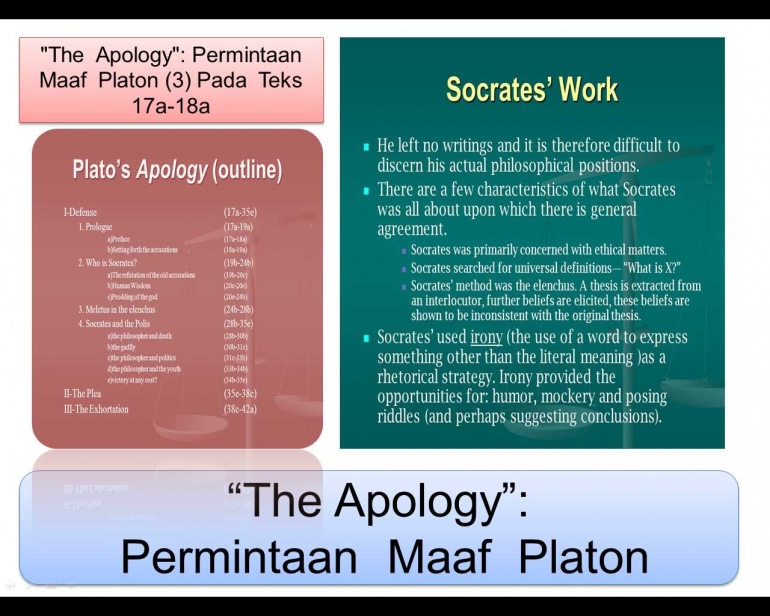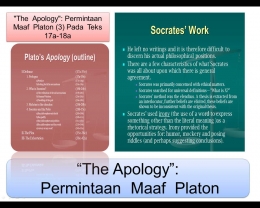"The Apology": (3) Pada Teks 17a-18a
The Apology: Permintaan Maaf Platon adalah teks pada adalah sebuah laporan tentang pidato yang di buat Socrates pada persidangan di mana dia dituduh tidak mengakui para dewa yang diakui oleh negara, menciptakan dewa baru, dan merusak pemuda Athena. Namun, pidato Socrates sama sekali bukan "permintaan maaf" dalam pemahaman modern kita tentang kata itu.
Nama dialog berasal dari bahasa Yunani "apologia," diterjemahkan sebagai pertahanan, atau pidato yang dibuat dalam pembelaan. Untuk memahami teks 17a-18a saya memakai Henricus Stephanus (Henri Estienne), yang memuat penomoran pada teks Platon atau dikenal Stephanus pagination is a system of reference and organization used in modern editions and translations Platon. Berikut ini adalah text 17a-18a, Plato's Apology of Socrates:
How you, men of Athens, have been affected by my accusers, I do 17a not know1 . For my part, even I nearly forgot myself because of them, so persuasively did they speak. And yet they have said, so to speak, nothing true. I wondered most at one of the many falsehoods they told, when they said that you should beware that you are not deceived by me, since I am a clever speaker.
They are not ashamed b that they will immediately be refuted by me in deed, as soon as it becomes apparent that I am not a clever speaker at all; this seemed to me to be most shameless of them---unless of course they call a clever speaker the one who speaks the truth. For if this is what they are saying, then I too would agree that I am an orator---but not of their sort.
So they, as I say, have said little or nothing true, while from me you will hear the whole truth---but by Zeus, men of Athens, not 17b beautifully spoken speeches like theirs, adorned with phrases and c words; rather, what you hear will be spoken at random in the words that I happen upon---for I trust that the things I say are just---and let none of you expect otherwise.
For surely it would not be becoming, men, for someone of my age to come before you fabricating speeches like a youth. And, men of Athens, I do very much beg and beseech this of you: if you hear me speaking in my defense2 with the same speeches I am accustomed to speak both in the marketplace at the money---tables, where many of you have heard me, and else--- where, do not wonder or make a disturbance3 because of this.
For d this is how it is: now is the first time I have come before a law court, at the age of seventy; hence I am simply4 foreign to the manner of speech here. So just as, if I really did happen to be a foreigner, you would surely sympathize with me if I spoke in the dialect and way in which I was raised, so also I do beg this of you now (and it is just, at 18a least as it seems to me): leave aside the manner of my speech---for perhaps it may be worse, but perhaps better---and instead consider this very thing and apply your mind to this: whether the things I say are just or not. For this is the virtue5 of a judge, while that of an orator is to speak the truth.
Intisari isi teks 17a-18a, bahwa Socrates membuka kasusnya dengan mengajukan banding kepada hakim juri untuk mendengarkannya secara terbuka dan mengampuninya jika Socrates mampu memberikan argumentasi yang bisa meluluskannya. Semcam sidang skripsi, tesis, atau disertasi, diantara tertuduh, dan pembelaannya.
Para penuduhnya telah berbicara menentang Socrates dengan cara bersemangat di pengadilan. Para penuduhnya telah memperingatkan hakim juri untuk tidak tertipu oleh Socrates, sebagai pembicara yang terampil dalam retortika.
Socrates mengetahui cara para penuduhnya, mengklaim sementara pidato penuduhnya berisi retorika dan keterampilan hebat. Dan Socrates tidak memiliki kemampuan untuk berbicara dengan baik. Namun, Socrates berkomentar, pasti berbicara kebenaran sedangkan lawan-lawannya hanya mengucapkan dusta atau retortika belaka.











